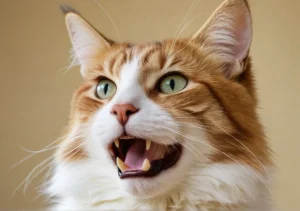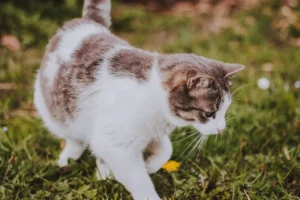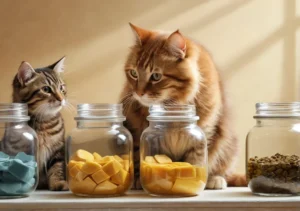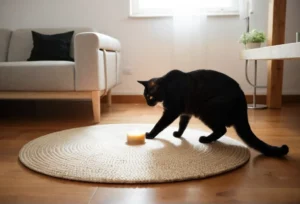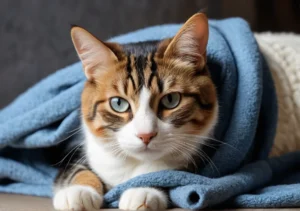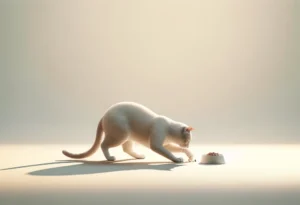Cats are mysterious creatures, known for their quirky behaviors and unpredictable antics. One common behavior that often leaves owners puzzled is when cats suddenly act as if they are dead. But why do cats do this? What motivates them to play dead or feign an injury? Let’s explore the reasons behind this fascinating feline behavior.
Instinctual Survival Mechanism
Have you ever seen your cat suddenly drop to the floor and play dead? While it might seem odd, this behavior actually has a purpose. In the wild, cats use playing dead as an instinctual survival mechanism. By staying still and appearing lifeless, they can trick predators into thinking they are already dead, making it less likely for them to be attacked. This clever trick allows cats to escape danger and live to see another day.
It’s fascinating how cats have evolved to adapt to their surroundings, using every tool in their arsenal to survive. So, the next time your furry friend plays dead, remember that it’s not just a silly act – it’s a smart strategy honed through generations of cat instincts.
Attention-seeking Behavior
On the other hand, some cats may play dead not out of instinct, but as a way to grab your attention. Cats are intelligent creatures, and they quickly learn what behaviors elicit a response from their owners. If your cat has discovered that playing dead gets a strong reaction from you, they may start doing it more often to get the affection and attention they crave.
If you notice your cat playing dead frequently, try to understand the underlying reason behind this behavior. It could be a cry for attention or a desire for more interaction with you. By engaging with your cat in meaningful ways, you can help fulfill their social needs and strengthen your bond with your feline friend.
And remember, just like us, cats also seek love and connection in their own unique ways. Pay attention to their cues and respond with care and understanding.
- Unique Insight: Some cats may play dead as a way to cope with stress or anxiety. If your cat exhibits this behavior during tense situations, consider consulting with a veterinarian to address any underlying issues affecting their well-being.
Remember, understanding why your cat acts the way they do can deepen your relationship with them and create a stronger, more fulfilling bond. So, the next time your feline friend plays dead, appreciate their cleverness and respond with love and compassion.
Playful Behavior
Cats are mysterious creatures, aren’t they? When they start acting dead, it might just be their way of playing around. Yup, you heard that right! Playing dead is actually a form of play for cats, similar to when they stalk their toys, pounce on imaginary prey, or bat at objects. It’s like they’re saying, “Check out my acting skills!”
Stress or Anxiety Response
Now, here’s something to ponder on: Have you ever considered that your cat might be feeling stressed or anxious when they play dead? Sometimes, cats use this behavior as a coping mechanism in overwhelming situations. It’s like their way of saying, “I need a breather, please leave me alone for a bit.” Understanding this side of your feline friend can help you provide the support and comfort they need in those stressful moments.
Additional Unique Insight: Cats might also play dead as a survival instinct, mimicking what they would do in the wild when faced with a threatening situation. It’s their way of staying safe and avoiding potential danger.
- Remember to create a safe and comfortable environment for your cat to reduce stress levels.
- Consult with a veterinarian or animal behaviorist if you notice frequent episodes of your cat playing dead.
- Provide mental and physical stimulation through interactive toys and play sessions.
Medical Reasons
If your cat is showing signs of playing dead, it could be due to underlying medical conditions or injuries. Conditions like seizures, heart problems, or neurological issues can cause this behavior. It’s crucial to seek veterinary attention immediately if you notice your cat behaving this way frequently. Remember, early detection and treatment can make a big difference in your cat’s health and well-being.
Training and Reinforcement
Cats are smart creatures that learn through training and reinforcement. If your cat is pretending to be dead, it might be because they have learned that this behavior leads to rewards or attention. Positive reinforcement techniques can help encourage desired behaviors and discourage ones that are problematic. Make sure to use treats, toys, and praise to encourage the behaviors you want to see in your cat.
Additional unique insight or angle:
Creating a consistent routine and providing mental stimulation through playtime and interactive toys can also help prevent attention-seeking behaviors like playing dead. By keeping your cat engaged and entertained, you can reduce the likelihood of them resorting to such behaviors for stimulation.
Remember, understanding why your cat is acting a certain way is key to addressing the issue effectively. By considering both medical and behavioral factors, you can work towards providing the best care for your feline friend.
Evolutionary Perspective
Curious why your cat sometimes acts like it’s auditioning for a role in a feline version of the “Walking Dead”? Well, let’s take a trip down evolution lane. Cats, in all their mysterious glory, have inherited some interesting behaviors from their wild ancestors. In the wild, playing dead can actually be a smart survival strategy for cats. By appearing lifeless, they may trick potential predators into thinking they are no longer a threat or worth pursuing. This instinct to play dead could be deeply rooted in their DNA as a means of avoiding danger. So, the next time your furball pulls a dramatic fainting act, know that it might be their way of tapping into their ancient survival instincts.
Bonus: Fun Facts About Cat Behavior
Ready to dive into the quirky world of feline behavior? Cats can be puzzling creatures, but understanding their antics can deepen your bond with your furry companion. Did you know that cats have a unique way of communicating with us through vocalizations, body language, and even the occasional “playing possum” routine? While playing dead may seem dramatic, it can also be a sign of your cat feeling overwhelmed or anxious. Paying attention to your cat’s subtle cues can help you decipher their feelings better. Remember, cats have their own language, and learning to speak it can lead to a paw-sitively purr-fect relationship with your feline friend.
- Fun Fact 1: Cats have a grooming ritual that goes beyond just keeping clean. It’s a way for them to mark their territory with their scent, claiming ownership over their surroundings.
- Fun Fact 2: Ever noticed your cat kneading your lap like dough? This behavior stems from kittenhood, where they kneaded their mother’s belly to stimulate milk flow. It’s a sign of comfort and contentment.
- Fun Fact 3: While cats are known for their independent nature, they are social animals that form strong bonds with their human companions. Building trust and providing a secure environment can nurture a deep connection with your whiskered friend.
For more fascinating insights into cat behavior, check out this comprehensive guide on feline communication: Understanding Your Cat’s Behavior.
Alex, a passionate animal lover, has experience in training and understanding animal behavior. As a proud pet parent to two dogs and three cats, he founded AnimalReport.net to share insights from animal experts and expand his knowledge of the animal kingdom.


